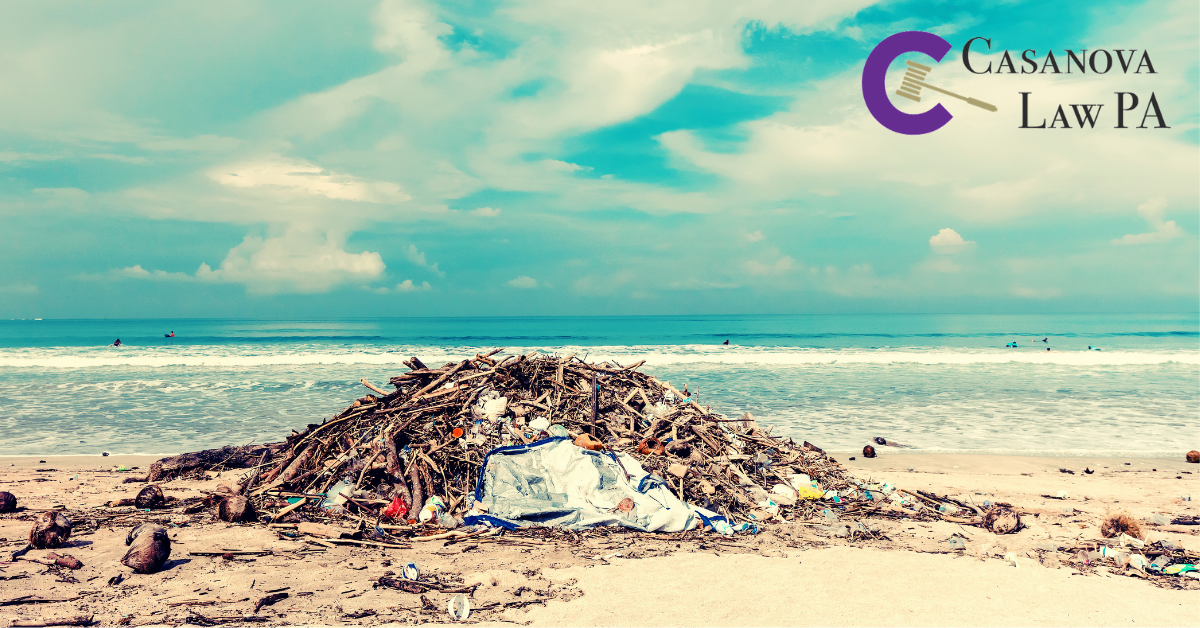The holidays have ended, and many of us are enjoying all of our new gifts. Updated items, in turn, encourage us to get rid of older things that have been taking up space in our homes. Out with the old; in with the new! By the time the month of March arrives, most of us have “spring cleaning” in mind. We seek to clear out the “junk” through donations, curbing, or selling items through local market places.
Out of exhaustion or a busy schedule, we may decide to “dump” our old stuff in a less-than-prudent manner. While this may not seem like a big deal (after all, oftentimes passersby pick up our trash as their treasure), illegal dumping can rise to the level of a criminal offense – in some cases even a felony! It is important to learn how to properly dispose of items in order to avoid civil or criminal liability.
Florida Litter Law
Florida Statute section 403.413 is commonly known as the “Florida Litter Law.” It sets out prohibited acts involving littering or dumping and outlines the potential penalties for violations. According to the statute, it is illegal to dump litter “in any manner or amount” in the following places:
- On a public highway or any other public land
- In any body of water
- On private property
Littering Penalties in Florida
A majority of people assume that the penalty for littering is limited to a warning or a fine. While this is true of cases involving noncommercial litter weighing 15 pounds or less, the more serious instances of littering can lead to a criminal charge. The criminal penalties for littering are:
- For an amount more than 15 pounds but not exceeding 500 pounds, and not for commercial purposes, a year in jail and a $1000 fine (first degree misdemeanor).
- For an amount more than 500 pounds, or any quantity for commercial purposes, five years in prison and a $5000 fine (third degree felony).
In addition to the above penalties, a judge may order the violator to perform community service related to the offense (such as picking up litter). For felony offenses, a court may order restitution or compel the violator to repair the property damaged as a result of the littering.
Littering and Driving
If the alleged dumping or littering involves the use of a motor vehicle, the law requires the court to forward the information to the DMV. Did you know that you could receive a moving violation by throwing something outside of your vehicle? This can incur points on your driver’s license and even put you at risk for suspension.
Furthermore, any vehicles used in the commission of a littering offense over 500 pounds are subject to forfeiture.
Who can enforce litter laws?
The statute dictates that all law enforcement officers are to enforce these laws. This can include your local police department, Sheriff’s Office, FHP and – yes – even Florida Fish and Wildlife (FWC) officers.
Tips to avoid littering charges and accusations
You can avoid a littering charge by trying some of these simple tips:
- Keep a small trash bag in your car and dump trash out only in actual, authorized trash bins
- Don’t over-fill your garbage cans
- Ensure you have tight fitting lids
- Dispose of larger appliances or items in the proper designated locations
- Get proper environment education
Curbing
“Curbing” items normally entails placing larger items on the curb, hoping either someone comes and takes them or the items get picked up by Solid Waste Authority (SWA). Just be sure that the location you use for curbing is a designated trash pick-up site. There are some locations – normally in rural areas – that become a popular location to drop off unwanted goods, but may not be a legally permissible trash dumping area. This, too, is considered littering.
Why is it important to avoid littering?
Aside from the potential for criminal liability, keep in mind that littering can affect the environment and ecosystems. Littering can cause physical harm or injury to people and animals as well as facilitate the spread of disease. Pollution affects us all and clean-up costs can be high. Everything is connected; littering can affect aesthetic value and tourism, which brings in money. Heavily littered areas can become a breeding ground for unwanted animals and insects. The trash finds its way to the water affecting our water, seafood and air.
Cited or Arrested for littering?
Sometimes it is difficult to find a proper place to dispose of garbage. A lack of receptacles is normally the cause. Should you ever find yourself with a civil citation or a criminal charge, call Casanova Law to fight your case. Our law firm’s extensive experience with criminal defense and civil citations can give you the advantage in your defense. Servicing Palm Beach and Martin counties, Casanova Law handles all ranges of littering charges.
Contact us today to schedule a consultation.
(561) 236-5340
info@casanovalawpa.com








